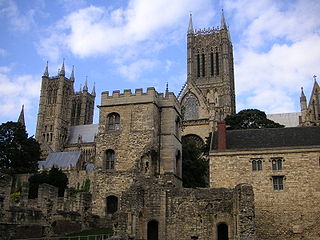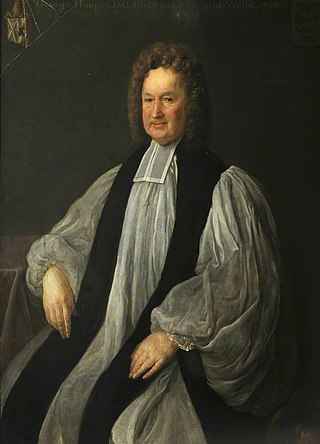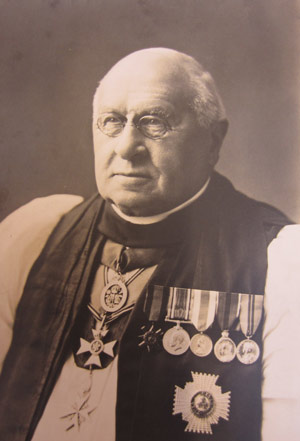Related Research Articles

The Abbey Church of Saint Peter and Saint Paul, commonly known as Bath Abbey, is a parish church of the Church of England and former Benedictine monastery in Bath, Somerset, England. Founded in the 7th century, it was reorganised in the 10th century and rebuilt in the 12th and 16th centuries; major restoration work was carried out by Sir George Gilbert Scott in the 1860s. It is one of the largest examples of Perpendicular Gothic architecture in the West Country. The medieval abbey church served as a sometime cathedral of a bishop. After long contention between churchmen in Bath and Wells the seat of the Diocese of Bath and Wells was later consolidated at Wells Cathedral. The Benedictine community was dissolved in 1539 during the Dissolution of the Monasteries.
Robert Winchelsey was an English Catholic theologian and Archbishop of Canterbury. He studied at the universities of Paris and Oxford, and later taught at both. Influenced by Thomas Aquinas, he was a scholastic theologian.

Richard Poore or Poor was a medieval English bishop best known for his role in the establishment of Salisbury Cathedral and the City of Salisbury, moved from the nearby fortress of Old Sarum. He served as Bishop of Chichester, Bishop of Salisbury and Bishop of Durham.

The Diocese of Bath and Wells is a diocese in the Church of England Province of Canterbury in England.
The Submission of the Clergy was a process by which the Catholic Church in England gave up their power to formulate church laws without the King's licence and assent. It was passed first by the Convocation of Canterbury in 1532 and then by the Reformation Parliament in 1534. Along with other Acts passed by the Parliament, it further separated the Church from Rome.

The English Reformation Parliament, which sat from 3 November 1529 to 14 April 1536, established the legal basis for the English Reformation, passing major pieces of legislation leading to the break with Rome and increasing the authority of the Church of England. Under the direction of King Henry VIII of England, the Reformation Parliament was the first in English history to deal with major religious legislation, much of it orchestrated by, among others, the Boleyn family and Thomas Cromwell. This legislation transferred many aspects of English life away from the control of the Catholic Church to control under The Crown. This action both set a precedent for future monarchs to utilize parliamentary statutes affecting the Church of England; strengthened the role of the English Parliament; and provided a significant transference of wealth from the Catholic Church to the English Crown.

Reginald Fitz Jocelin was a medieval Bishop of Bath and an Archbishop of Canterbury-elect in England. A member of an Anglo-Norman noble family, he was the son of a bishop, and was educated in Italy. He was a household clerk for Thomas Becket, but by 1167 he was serving King Henry II of England. He was also a favourite of King Louis VII of France, who had him appointed abbot of the Abbey of Corbeil. After Reginald angered Becket while attempting to help negotiate a settlement between Becket and the king, Becket called him "that offspring of fornication, that enemy to the peace of the Church, that traitor." When he was elected as a bishop, the election was challenged by King Henry's eldest son, Henry the Young King, and Reginald was forced to go to Rome to be confirmed by Pope Alexander III. He attended the Third Lateran Council in 1179, and spent much of his time administering his diocese. He was elected Archbishop of Canterbury in 1191, but died before he could be installed.
Jocelin of Wells was a medieval Bishop of Bath. He was the brother of Hugh de Wells, who became Bishop of Lincoln. Jocelin became a canon of Wells Cathedral before 1200, and was elected bishop in 1206. During King John of England's dispute with Pope Innocent III, Jocelin at first remained with the king, but after the excommunication of John in late 1209, Jocelin went into exile. He returned to England in 1213, and was mentioned in Magna Carta in 1215.

In the Roman Catholic Church and the Anglican Communion as well as some Lutheran denominations, a rural dean is a member of clergy who presides over a "rural deanery" ; "ruridecanal" is the corresponding adjective.

George Wyndham Kennion, DD was the Anglican Bishop of Adelaide, and later Bishop of Bath and Wells.
John of Tours or John de Villula (died 1122) was a medieval Bishop of Wells in England who moved the diocese seat to Bath. He was a native of Tours and was King William I of England's doctor before becoming a bishop. After his consecration as bishop, he was either given or purchased Bath Abbey, a rich monastery, and then moved the headquarters of the diocese from Wells, to the abbey. He rebuilt the church at Bath, building a large cathedral that no longer survives. He gave a large library to his cathedral and received the right to hold a fair in Bath. Not noted for his scholarship, he died suddenly in 1122.

Hugh of Wells was a medieval Bishop of Lincoln. He began his career in the diocese of Bath, where he served two successive bishops, before joining royal service under King John of England. He served in the royal administration until 1209, when he was elected to the see, or bishopric, of Lincoln. When John was excommunicated by Pope Innocent III in November 1209, Hugh went into exile in France, where he remained until 1213.

George Hooper was a learned and influential English High church cleric of the late seventeenth and early eighteenth centuries. He served as bishop of the Welsh diocese, St Asaph, and later for the diocese of Bath and Wells, as well as chaplain to members of the royal family.
William Gordon Reid is an Anglican priest and former Dean of Gibraltar and Vicar General of the Diocese of Gibraltar in Europe.

James Montague was an English bishop.
Edward Lowry Henderson was a priest in the Church of England and the Scottish Episcopal Church.

Christ Church, Bath is a proprietary chapel on Julian Road, Bath, England.

John Taylor-Smith was an Anglican bishop and military chaplain. He was the Anglican Bishop of Sierra Leone by the end of the 19th century and the Chaplain-General to the Forces from the year 1901 to 1925.
The Taxatio Ecclesiastica, often referred to as the Taxatio Nicholai or just the Taxatio, compiled in 1291–92 under the order of Pope Nicholas IV, is a detailed database valuation for ecclesiastical taxation of English, Welsh, and Irish parish churches and prebends.
Ruth Elizabeth Worsley, is a Church of England bishop. Since September 2015, she has been the Bishop of Taunton, a suffragan bishop of the Diocese of Bath and Wells. From 2013 to 2015, she was Archdeacon of Wiltshire.
References
- ↑ "The Clergy-Man's Vade Mecum: Or, an Account of the Antient and Present Church of England; the Duties and Rights of the Clergy; and of Their Privileges and Hardships, Etc."Johnson, J. p284: London; John Nicholson; 1706
- ↑ Alumni Oxonienses 1500–1714, Chocke-Colepeper
- ↑ Horn, Joyce M. (1971), Fasti Ecclesiae Anglicanae 1541–1857, vol. 2, pp. 15–17